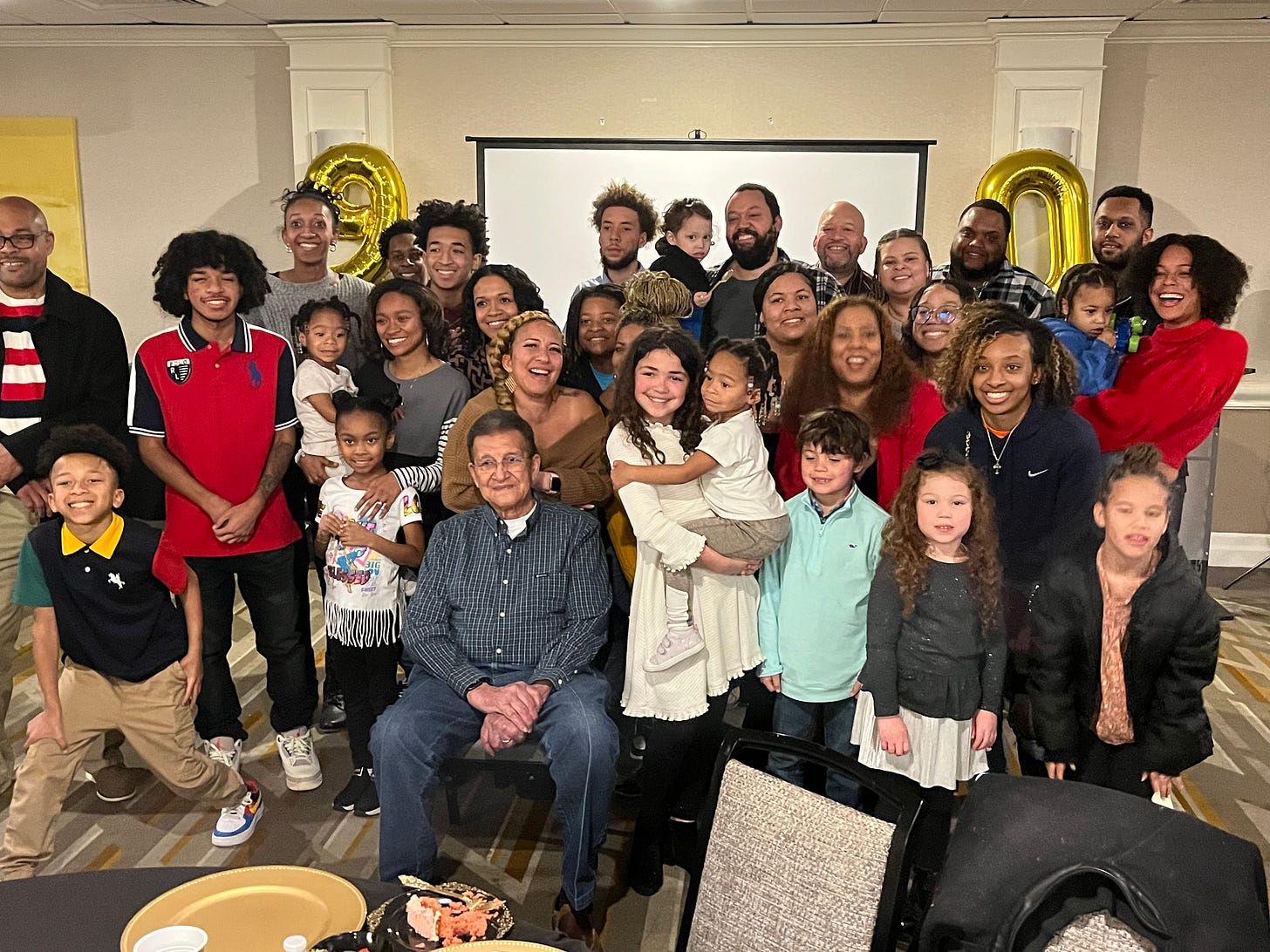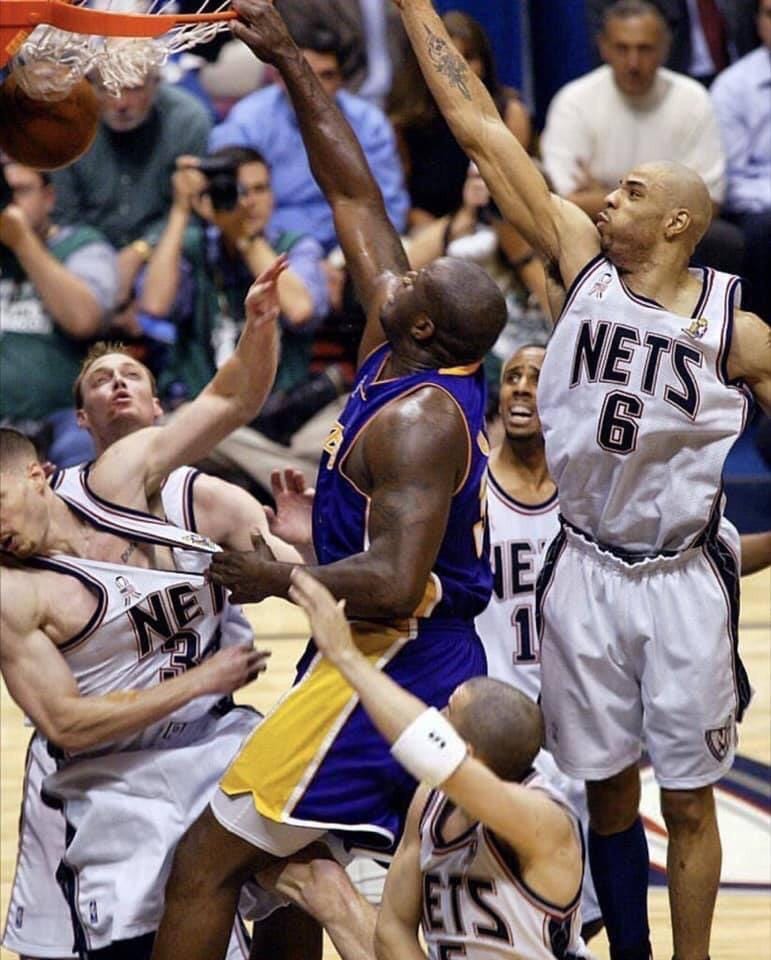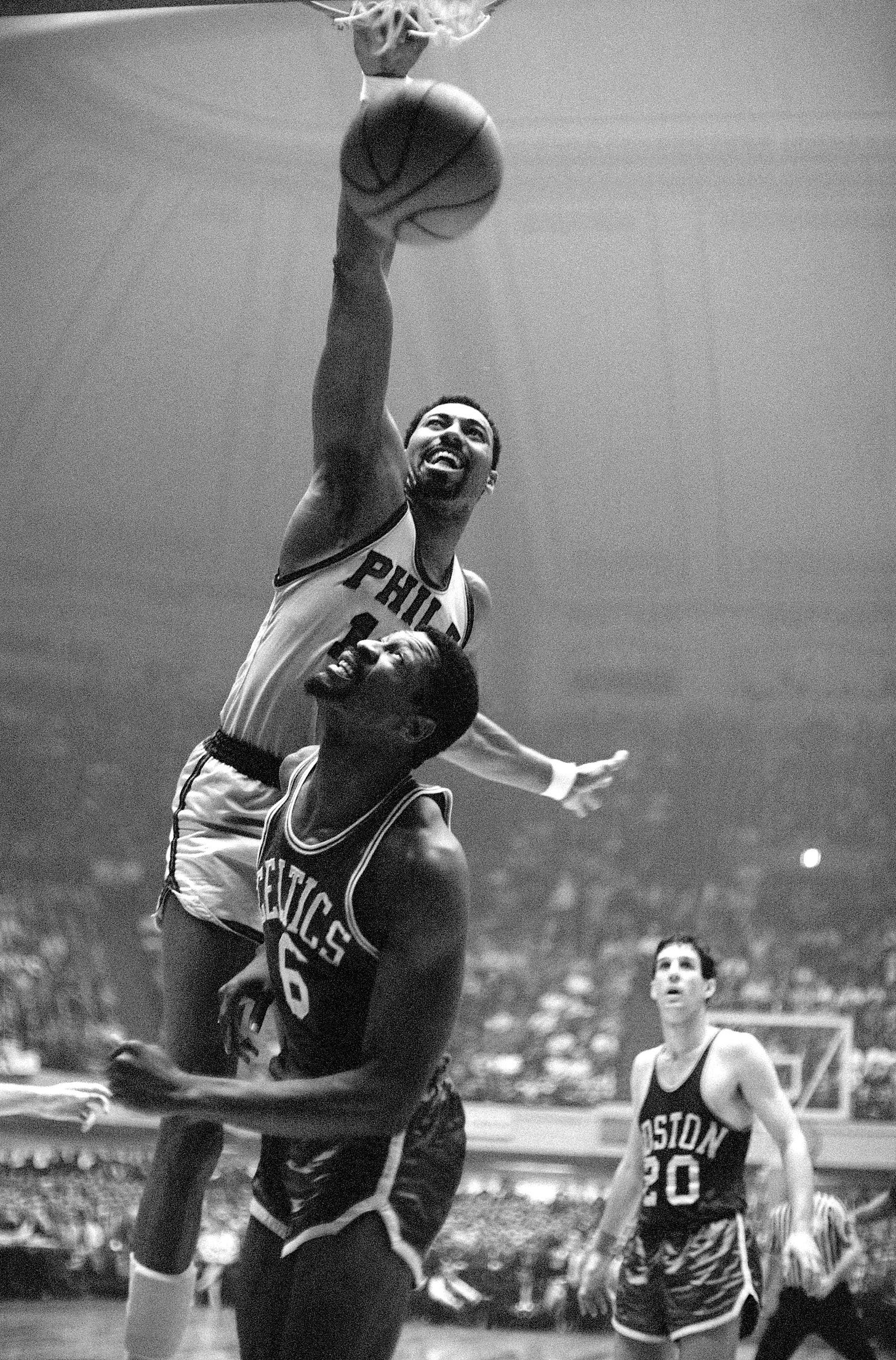Lessons from my Grandpa: Wisdom from a Lifetime of Basketball
I sat down with my grandfather for a conversation about basketball.
In my family debating is a pastime for us. Sports, politics, music, no subject is off limits. But the most frequently debated subject amongst my immediate family as well as my extended family is the sport of basketball. Basketball is something that transcends generations as everyone has strong opinions about it and an encyclopedic set of statistics, anecdotes, and examples to back them up. We have Celtics fans, Mavericks fans, Pacers fans, Louisville fans, and even Kentucky fans! One of my parents favorite things to do during the basketball season is to visit my paternal grandfather and debate with him about the latest happenings in the sport. My grandfather at the ripe age of 91 is a fount of knowledge, wisdom, opinions and hot takes that have been cultivated over many decades of playing and watching basketball. It is especially fun and sometimes funny to hear his opinions on the latest debates, controversies, and playoff matchups. It’s almost necessary to find these things out right as they happen. Recently, I had the privilege of interviewing him and asking him about his perspective on basketball and finding out how all of these debates and hot takes going around ESPN and social media appear to someone like him with the vantage point of five decades of watching basketball. These are some of the lessons I learned from how he approaches these conversations.
“You can’t compare players from different eras”
One of the points that grandpa emphasized the most across the hour I spoke to him was the progress and evolution of the game of basketball. Each era had its own distinct playing style centered around the unique talents suited specifically for that time. For him it’s not a useful conversation to compare someone like Shaquille O’Neal to someone like Giannis Antetokounmpo or even to someone like Wilt Chamberlain. There are too many what ifs that factor into these types of debates. Yes Shaq was one of the most dominant forces ever. But Shaq as we knew him was not conditioned to play in a league like the modern day where shooting, spacing and pace are the utmost importance. As grandpa said “He’d fall over and die halfway before the game is over…plus, you have to be within three feet of your man. If his man is standing over by the three point line, where is he going to be?”
The progress of the modern era
For all of the constant negativity directed at the modern NBA by people who prefer older generations of basketball, Grandpa had a lot of positive things to say about the state of the NBA today. The level of talent and skills across the league have never been as high with any player having the ability to shoot and score at a high volume when asked. He has never seen an era with the level of parity in competition that the NBA has today. Back then “there was no room for anyone but the superstars”. He pointed to the feud between Michael Jordan and his teammate BJ Armstrong with Jordan demanding to know whose team this was. The ability for players to get along today is a strong suit, not a shortcoming of modern players. It allows for players to more readily embrace different roles without worrying as much about stepping on the feet of the superstars and risk being alienated. He loves to see the players on the bench jumping up and down and celebrating their team’s success regardless of who is leading the team at any given moment. A team that he named that embodied these qualities he likes about the modern NBA was the Golden State Warriors dynasty.

He placed his view of the NBA today within the context of technological progress throughout his lifetime. Being someone who enjoys cooking he gave the air fryer as an example of something that has made cooking a diverse array of foods more accessible to people and has made the cooking process for him much easier. The level of skill amongst all players in the league, the three-point shooting, the complexity of offenses are all part in parcel of an overall improvement in the quality of the sport as well as the entertainment value.
His era of basketball
When I asked Grandpa about what it was like to watch the NBA in decades like the 1960s and 1970s, he flat out states “frankly it was kind of boring”. He didn’t enjoy how much the superstars were glorified. Everything they did was beautiful or magnificent. He compared it to how the golfer Tiger Woods was treated in his heyday. “If you said anything about Tiger, you were gone”. The games themselves were also inaccessible to most people as they were generally region locked. Early on he had to listen to the games on the radio. He said that games generally only came on television on Sundays and you only ever saw players outside of your region when the playoffs began.
Grandpa balanced his views of the 1960s and 1970s though when he began to talk about individual players. One of the players he noted that wasn’t glorified by the media of the time was Wilt Chamberlain. “They didn’t like Wilt. So there was no glory thrown his way because Wilt was arrogant. Like Wilt would say preseason, ‘what am I looking forward to this season? I think I’ll average about 50’ and then he’d go out and do it.” Though he didn’t explicitly state Wilt Chamberlain as being one of his favorite players, he spoke for about ten minutes about Wilt’s records, accolades, and funny stories about him.
Bill Russell was a player who is his peer, being only a year younger than him, so he was a player that Grandpa followed throughout his career. When I asked him what the oldest NBA finals he remembered watching, he named the only instance where Russell’s Celtics lost in the finals in 1958 at the hands of the St. Louis Hawks before going on to win 8 straight NBA championships. He went on to say that he remembered Russell’s rookie season because they were peers.
The other player Grandpa named was Oscar Robertson. “Before all this Michael Jordan stuff came along, the prototypical all American boy was Oscar Robertson. Every team he played on from probably mid high school, the whole starting five averaged double figures. For me that’s a point guard getting the job done.”
People’s bias toward their own era
Grandpa contrasted the way that Oscar Robertson played to Michael Jordan and weighed in on his opinions about the GOAT debates (greatest of all time). “My take on this Michael Jordan and the likes of that stuff is that most of the people who will say that are within Michael Jordan’s era. You won’t find any young dudes 20 or 25 now saying Michael Jordan is the best. They’re gonna go with something they know something about”. He stated that everyone likes to think that their time was the best time. Placing this statement placed in the context of his views about the evolution of the game, it makes sense that he wouldn’t tether himself to any era of basketball in specific. He has seen many players come and go and has seen many careers play out. There have always been great players and there will always be great players.
In this light, Grandpa also doesn’t appreciate how statistics from different eras are compared on in one-to-one way without context. He pointed out talking points he heard to glorify more recent players’ accomplishments at the expense of older eras such as the notion that Caitlin Clarke surpassed Pete Maravich’s scoring record. In absolute terms, she surely did. But when placed in context, Pete Maravich played around half the games that Caitlin Clark did to get his numbers without a three-point shot at his disposal. In that light Pete Maravich’s record still stands as an impressive scoring achievement and should not be diminished in conversations.
He did however go on to talk about the impact Caitlin Clark is having on women’s basketball and the viewership she is bringing. Her and her peers are bringing money, endorsements, and attention at a college level in way that he hasn’t seen before. He has even kept up with Caitlin Clark’s WNBA career, having a television package that allows him to watch WNBA games as prodigiously as he does NBA and college basketball games.
Grandpa’s hot takes
My conversation with Grandpa was not devoid of his own spicy or hot takes about basketball. These are the places where you can really see his strong opinion shine through. When talking about 90s basketball, he noted that basketball is supposed to be a non-contact sport and that allowing players to wrestle and tackle each other isn’t good for the health of the game. It diminishes skill and reduces the game to a mud fight.
Regarding the MVP award, Grandpa believes the award itself is extremely subjective and relies on your own definition of what “most valuable” means. For him, the most valuable player on a team is the player that cannot be removed from the team. If that player were to be removed, then the team itself would cease to function as it should. In that light he named Draymond Green as the MVP of the Warriors dynasty, pointing to his importance to the coherence of the team’s defense and defensive identity. We saw the importance of Green this year when the Warriors failed to make the playoffs mainly due to the significant time Green spent out due to injury and suspensions.
When talking about the 1980s Celtics, Grandpa named Kevin McHale as the most important player on that team due to his dominance in the paint and the high percentage he shot the ball. He presented the conundrum of guarding McHale one on one to focus on Larry Bird, or doubling McHale and allowing Larry Bird to kill you. He said he would most certainly double McHale and live with Bird’s high scoring over McHale’s consistent scoring.
And of course Grandpa brought the conversation back to the ongoing 5 year argument my parents have been having with him regarding Jayson Tatum and the Boston Celtics. For my entire life Grandpa has been no fan of the Boston Celtics, and always has reserved his severe criticism for them. He criticized the 2008 Celtics as much as people criticized the Celtics today (though this did not mean he was enthusiastic about Kobe’s Lakers either). Grandpa stated that we need to “stop making excuses for Jayson Tatum.” Grandpa doesn’t care how young Tatum is. He’s been in the league for seven seasons. His development should reflect that reality and not his age. Grandpa also stated that he did not understand what Boston’s offense was trying to do. He compared it to the Indiana Pacers’ offense that similarly relies on penetration and the resultant ball movement, except where the Pacers pass the ball and keep it moving across the floor, the Celtics move the ball around seemingly static players across the three point line. He doesn’t like the stagnancy their offense can have as a result of how they play.
Why we are Celtics fans
This debate has been the most recurring debate. The merit of the Boston Celtics. At one point last year, Grandpa grew so exasperated with our support for the Boston Celtics that he asked how we got to be Celtics fans in the first place. This is where my dad informed him that it was he, who made my dad a Celtics fan when he brought a Bill Russell poster and placed it in his room as a child telling him that this man was the first black coach in the NBA. Nonetheless, he was surprised to hear that he was the reason for our Celtics support.
How players supported themselves after the NBA
In my conversation with Grandpa, he brought up the fact that Russell was the first black coach and the first and only player-coach to win a championship. He noted that this was indeed a feature of how the old Boston Celtics operated and how players elevated themselves to the next level following their retirement. Given players didn’t make that much money compared to modern players, coaching was the obvious next step to prolong your career beyond your 30s and that the Celtics had a system that cultivated this. Russell, K.C. Jones, Don Nelson, Tom Heinsohn, were all players from that era who went on to be head coaches. Grandpa also noted that because of the relatively low salaries for a sport where you retire in your 30s, many players of his era got an education in college and capitalized on that after retirement being able to have careers outside of basketball. He loved the fact that Oscar Robertson, despite knowing he was better than most players in the NBA, still graduated from college before entering the league.
Insights into Grandpa’s childhood
One of the most interesting parts of my conversation with grandpa was when I asked him how he first got into basketball. Unlike most of us that grew up in a time where basketball games were regularly broadcast and highlights were abound, this was not the case in the 1930s and 1940s. He said that of course he was always a Louisville Cardinals fan, but his interest in basketball came early from the very fact that there was a basketball court down the street from his house. Back in his time, there were all kinds of organized activities for children. The park became the center of recreation. This was mainly made possible by adult supervision in the form of park police and that children could stay at the park the entire day because of all the things organized there. At his local park there was basketball, paddle tennis, and softball. In this time baseball reigned supreme though, and was the sport that was the most organized. The sports-centered recreation for children was a result of not having anything else for children to do. Unlike today, shopping and as a result consumerism was inaccessible to black people because of segregation. Malls did not exist. The neighborhoods were generally safe and computers and social media were not around to keep children inside all day.
For me, hearing these kinds of stories and anecdotes are gems because of how much insight they give into a time that most of us today can’t even fathom. 90 years is an abstraction to most and across those 90 years Grandpa has seen and experienced a lot of change, much of which, such as technological change he has embraced. Some of the social change, especially regarding the the condition of black people today and their communities one can only lament. But these are the things that come along with having the privilege to live and thrive at such an advanced age. On Grandpa’s 90th birthday last year when I called him, I asked what it felt like to be 90. He answered simply and humbly, “At my age everyday is a blessing to be alive.” He cherishes everyday of his life and is an example for us all on how to live our lives and age with grace. It was truly a blessing to be able to have this conversation with him, and hopefully will be the first of many that I will have the privilege to write about.








